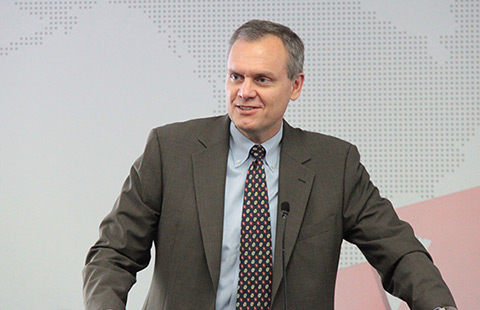Executive pay rising faster in China
When it comes to paying the boss, China is closing in on the United States, a new study shows.
Salaries of executives in China rose 8 percent in 2012, compared with 3 percent for US executives, according to the National Salary Comparison study by consultants ECA International.
The numbers, according to the London-based firm, put top Chinese executives on course to wield greater spending power than their US counterparts by 2017.
The study, released on Wednesday, has significant implications for US companies seeking to recruit executive talent from China. The resulting drop in buying power for Chinese expatriates moving to the US would "make it difficult for US companies to offer local salaries to Chinese executives".
ECA, which provides software and services for corporate management of foreign employees, found the typical Chinese executive's buying power was 75 percent that of a similar-level US manager last year, up from 57 percent in 2007. The study also found the buying power of a junior manager in China rose to 40 percent of a similarly situated US employee from less than a third in 2007.
"If the gap between US and Chinese buying power continues to close at the same rate, by 2017 Chinese executives will be better off than their US counterparts," the study said.
Christine Hayward, managing director for Asia-Pacific and the Middle East at the Association of Executive Search Consultants, said ECA's study affirms the findings of a survey of executives in China that her New York-based trade association conducted in October.
In the AESC survey, 60 percent of respondents believed the compensation gap between locals and expatriates is shrinking, Hayward said. What that means, she said, is that "there is a huge demand for local Chinese talent, and the local Chinese are becoming more sophisticated in understanding and knowing how to negotiate their compensation packages to be on par with those of expats".
ECA's National Salary Comparison looks at typical salaries for locally employed staff around the world and compares them in terms of relative buying power. The results show "whether an individual's spending power would be protected if moved to work in another country and paid a local salary to do a similar job".
The study calculates relative buying power in 55 countries, by converting to a common currency the median gross salaries paid for a particular position in the countries of interest; calculating the equivalent net salaries by deducting income tax and social security; and applying cost-of-living indexes to net salaries.
While Hayward declined to speculate on how Chinese executives' increased spending power might redraw the recruiting landscape by 2017, she said the salaries of executives in China "are becoming more and more on a par" with those of expat executives. She cited the results of a 2011 AESC study that asked if executive pay in China had become more globally competitive over the past five years.
According to Hayward, about 70 percent of those surveyed said executive compensation in China had either "significantly increased in competitiveness or moderately increased".
The latest studies show that companies in China "want local Chinese talent, not necessarily an expat to fill a role, especially now as the local Chinese have the management experience that they may not have had in the past", Hayward said.
"Executive-search firms have access to a wide range of talent pools and will work to fill an available role with the best person, whether that be a local or an expat," Hayward said. "Search firms already recognize the Chinese talent that exists, both locally and around the world, and the compensation that must be paid to attract an executive to take on a new position."
In October, further evidence of the rapid increase in executive pay in China was provided by the 2011 China Salary Development Report issued by the Ministry of Human Resources and Social Security. The report said executive salaries rose by 370,000 yuan ($59,000 at today's exchange rate) in five years. The average annual salary for company executives in 2010 was 668,000 yuan, up from 291,000 yuan in 2005.
michaelbarris@chinadailyusa.com























